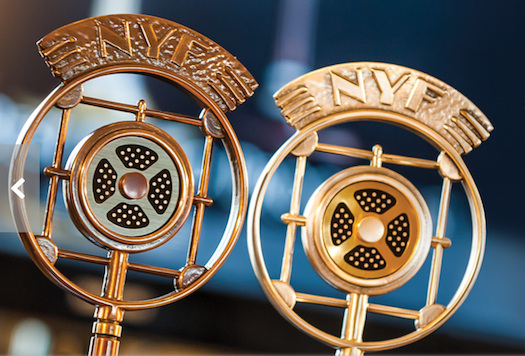8 tips to give you a winning edge.
Locally, an ACRA remains the pinnacle symbol of achievement for people who work in radio.
But why be content with being the best in Australia when you can gain global recognition by winning an award at New York Festivals – The World’s Best Radio Programs™?
Of course, on an international level the competition is much tougher. But think of the achievement if you win!
In recent years, The New York Festivals – The World’s Best Radio Programs™ has fielded around 260 entries from 32 countries each year. Winners come from places as diverse as India, Hong Kong, The Philippines, Australia, Taiwan, Egypt, Sweden and Colombia.
Last year, nine of the coveted awards were handed out to Australian networks and producers.
Entries are now open for the 2016 New York Festivals The World’s Best Radio Programs™. There’s no reason why you or your station can’t win one of these fabulous looking Art Deco radio microphone trophies and have bragging rights to being best in the world!
But hurry, you only have till March 18 to enter.
To help you in your endeavours, here are some tips from radioinfo contributor and seasoned awards judge James Cridland.
Here are eight ways to win a radio award, and have something for your trophy cabinet – and your CV
By James Cridland – first posted 3 January, 2015
I’ve judged a pile of radio awards – the ABC Local Radio awards, the Radio Academy Awards, the Student Radio Awards, the Gillards, and many, many more.
Judging awards is hard work, and takes a lot of concentration. But sometimes, award entries just don’t help themselves. Frustrating, often amateur mistakes put great broadcasters at a disadvantage.
So, based on my experience, here’s eight ways you can make your entries better
1. Don’t leave it to the last minute. The categories rarely change each year, so archive audio every week and keep it for the ACRAS, and the New York Festivals; as well as your compilation shows at the end of the year, the Radio Academy Awards or whatever replaces them, and your CV.
2. Please don’t use the horrible scratchy output from your logger system. Tinny and bitrate-starved audio puts you at an automatic disadvantage to everyone else. Judges are supposed to overlook that, but its hard not to. (And anyway, you can’t use that for on-air use later, can you?)
3. Don’t fill your time if you don’t need to. Yes, you have up to half an hour in many categories; but if you can convince the judges in twenty minutes, you get no extra points for padding.
4. Make the audio really count. The judges’ aim is to judge the audio in front of them. We can’t base our award on stuff we heard once but isn’t in your entry, because that wouldn’t be fair to stations we don’t listen to.
5. Make your audio back up the award you are entering. It should be really clear what this compilation is a compilation of, and how it answers the rubric of the category you’re entering. If it isn’t, you’re doing it wrong. (And trust me, many stations, big and small, have done it wrong).
6. Take care of your additional information. Poor photocopies or handwritten notes don’t help your entry.
7. But remember it’s a radio award, not a typesetting award, nor a “best use of the departmental laminator” award. The audio is what matters, over and above anything else. So take the time to mix it well, edit it nicely, and watch those levels. Lessen repetition in a compilation, if you can, particularly if there’s a signature tune or a voiced jingle for the feature you’re entering
8. But the most important rule is left to last. Enter. Because if you don’t enter, you’re guaranteed not to win.
Any other hints and tips? Tell us all, in the comments below.
About The Author
 James Cridland is a radio futurologist, and is Managing Director of media.info, a companion website to radioinfo and AsiaRadioToday.
James Cridland is a radio futurologist, and is Managing Director of media.info, a companion website to radioinfo and AsiaRadioToday.
He has served as a judge for a number of industry awards including the Australian ABC Local Radio Awards, the UK Student Radio Awards, and the UK’s Radio Academy Awards, where he has also served on the committee. He was a founder of the hybrid radio technology association RadioDNS.
James is one of the organisers of nextrad.io, the radio ideas conference each September, and is also on the committee of RadioDays Europe. He writes for publications including his own media.info, Radio World International and RAIN News.
James recently moved from North London to Brisbane with his partner and a two year-old radio-loving toddler. He very, very much likes beer.

